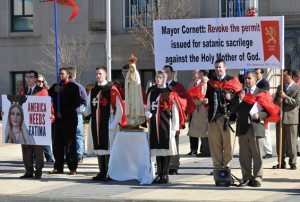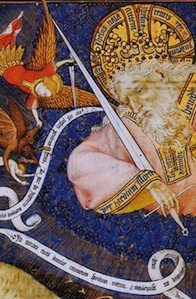On Christmas Eve, as we commemorate the most important and glorious event in the history of mankind — the birth of Our Lord Jesus Christ, the Incarnate Word and our Redeemer — a small Satanist group staged a sacrilegious act in front of the Catholic St. Joseph Old Cathedral in Oklahoma City by spilling costume blood over a statue of Our Lady.
“Don’t Pay Attention” to a Sacrilegious Group?
Many, even among Catholics, gave no importance to the fact claiming that it was something done by a small and insignificant group of devil worshippers. Hence they concluded that it was best to “pay no attention to them.” Those wishing to make reparation for the act could do so individually, praying inside a church. But they should avoid any public demonstration.
This approach has several flaws.
Firstly, it shifts the focus of attention. Instead of deliberating on the seriousness of the offense against God, it turns people’s attention to the small number of offenders.
Secondly, by disregarding the fact that the sacrilege against the Mother of God was done in public and on the eve

of the feast par excellence of Christianity, rather than in some hidden den (which would still be very serious). Moreover, in addition to being public, the sacrilege took on the characteristic of a challenge to Christians since it was done on that date and in front of a Catholic cathedral.
Finally — and in some ways even more serious — this diabolical act was done with the authorization and protection of civil authorities.
A Public Offense Requires Public Reparation
In face of this public sacrilege offending Mary’s honor and the challenge it poses to Catholics, zeal for God’s glory requires an equally public act of reparation, protest and inconformity rather than shy and resigned lamentations within church walls.

We should remember that while Jesus is the Prince of Peace, He is also the One Who came to bring fire and sword to Earth to combat the “prince of this world.”1
When the attack on the honor of the Virgin is done in public, that is, “before men,” it must be fought publicly with the sword of the Prince of Peace. For when peace, the tranquility of order, is attacked with the sword of evil, it must be restored by brandishing the sword of good.
The Example of Our Forefathers
That is what Catholics always understood in times of vibrant faith. Not content with crying inside churches, they put on “God’s armor,” “the breastplate of righteousness” and the “shield of faith”2 and went out to confront evil.
So it was with fighters during the Crusades and in the battle of Lepanto. They would often abandon home and homeland to attack the enemies of Christendom in their own strongholds. This spirit animated the Cristeros in Mexico and many heroes of our time who fight against communism and the resurgent Islamic danger.
A Unique Christmas Gift to the Savior
That was not lost on the youth of TFP Student Action, who decided to celebrate the Savior’s birth in a special way by offering Him a unique gift: showing up in Oklahoma City to combat in a peaceful and legal, but gallant and resolute way, the followers of the “father of lies” and the “murderer from the beginning.”3
Watch the Video on the Oklahoma City Sacrilege Here
They rejoiced at meeting other Catholics who felt the same ardor and showed the same boldness by standing up as true children of Mary Most Holy and of the Church Militant.
In the Darkness of Modern Paganism, the Light Continues to Shine
We must let the world know that the flame lit on that long-ago night, bringing light to the peoples who walked in darkness, continues to shine.
This has been a special Christmas for the youth of TFP Student Action and Catholics who publicly protested in Oklahoma City — including all those nationwide who supported the act of reparation, protesting via e-mails and phone calls organized by the American TFP and America Needs Fatima. It was a Christmas of struggle in defense of the Most Holy Mother of the Prince of Peace.
“Et lux in tenebris lucet et tenebrae eam non conprehenderunt.” “And the light shineth in darkness, and the darkness did not comprehend it.”4
Footnotes
- Cf. Isaias 9:6; Matthew 10:33–34; Luke 12:49; John 16:11.
- Cf. Eph. 6:10-20.
- John 8:44.
- John 1:5.
